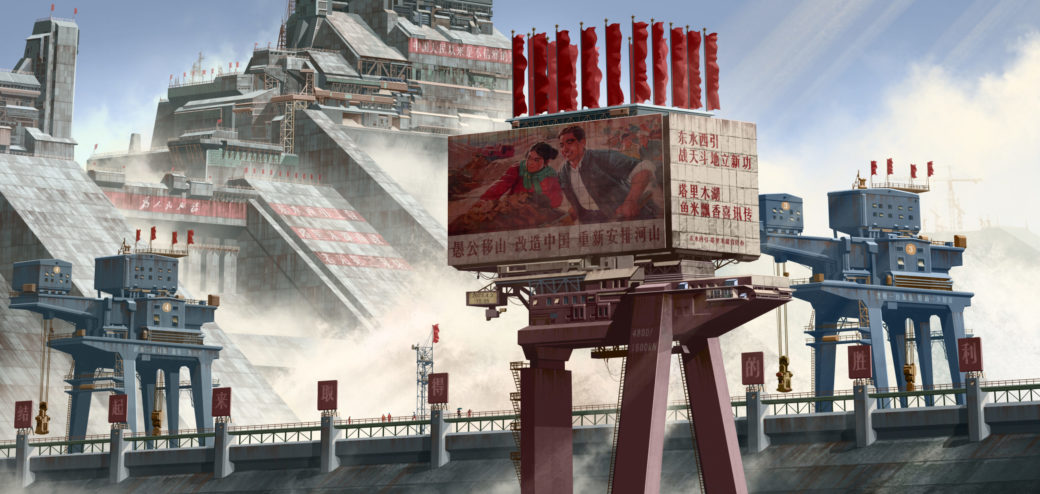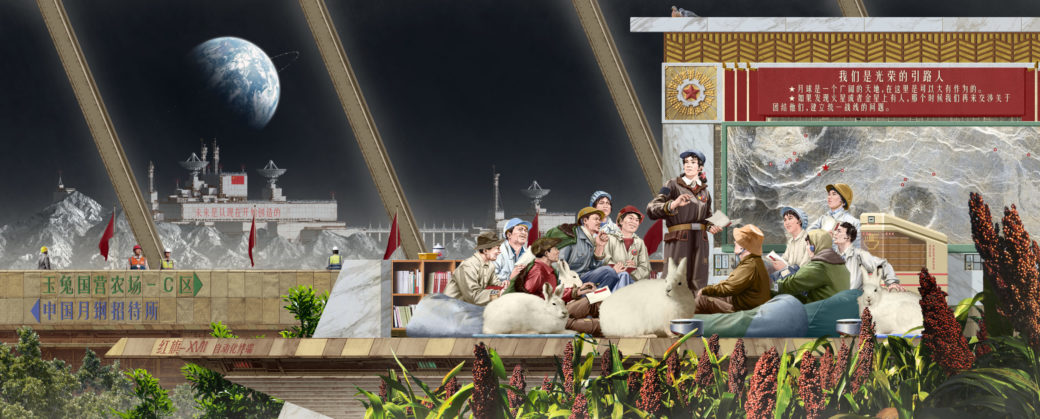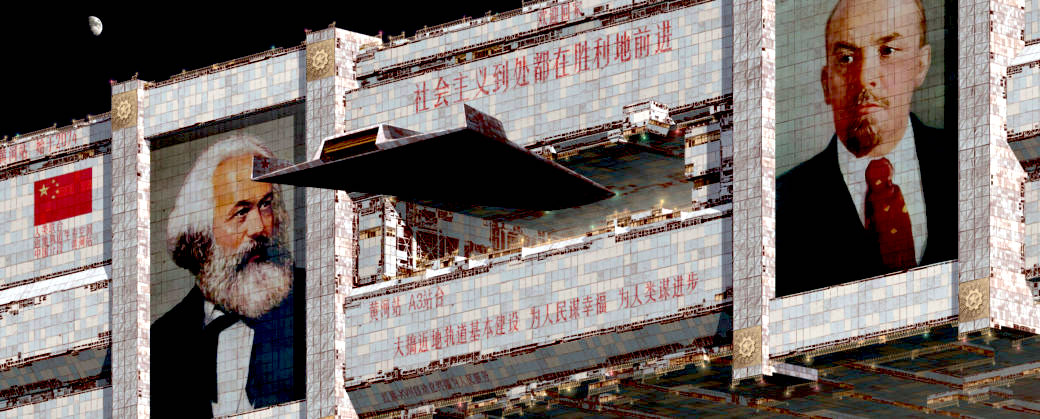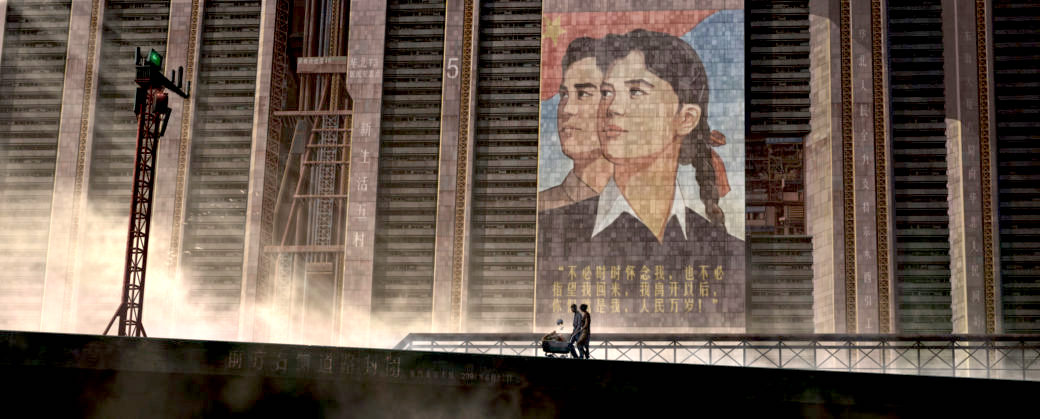China did not eradicate absolute poverty by cash transfer schemes or rural medical programmes alone, writes Vijay Prashad.

Fan Wennan, China, “China, 2098, Tarim Hunan Section – Ruoqiang Pumping Station,” 2019–2022.
By Vijay Prashad
Tricontinental: Institute for Social Research
 At the 2012 United Nations Conference on Sustainable Development held in Rio de Janeiro, member states decided to replace the Millennium Development Goals, established in 2000, with Sustainable Development Goals (SDGs).
At the 2012 United Nations Conference on Sustainable Development held in Rio de Janeiro, member states decided to replace the Millennium Development Goals, established in 2000, with Sustainable Development Goals (SDGs).
The first SDG was to “end poverty in all its forms everywhere.” Despite the enthusiastic verbiage, it was clear that poverty was simply not going to be ended across the world. Even before the Covid-19 pandemic, the data showed that poverty had become intractable.
In October 2022, the U.N. Development Programme and the Oxford Poverty and Human Development Initiative released its 2022 Global Multidimensional Poverty Index report, which showed that at least 1.2 billion people in 111 developing countries live in acute multidimensional poverty.
The “deprivation bundles” referred to in the full title of the report explore how a range of necessary facilities are absent for over a billion people. For example, the report notes, “Almost half of poor people (470.1 million) are deprived in both nutrition and sanitation, potentially making them more vulnerable to infectious diseases. In addition, over half of poor people (593.3 million) are simultaneously deprived in both cooking fuel and electricity.”
These “deprivation bundles” — the absence of both electricity and clean cooking fuel, for instance — amplify the low incomes earned by billions of people.
In 2017, the World Bank determined that the income threshold for poverty, which had been set at $1.90 per day, was far too low. They set the new poverty line at $2.15 per day, which accounted for over 700 million people.
The World Bank’s 2022 “Poverty and Shared Prosperity” report showed, using data from 2019, that if the poverty line is set at $3.65 a day, 23 percent of the world lives in poverty, and if the line is set at $6.85 a day, then almost half of the world’s population (47 percent) lives below the poverty line. These numbers are horrifying.

Fan Wennan, “Comrade Cháng’é’,” 2022.
What is extraordinary is that the U.N. report on deprivation bundles did not refer to the programme to eradicate extreme poverty in China.
On Feb. 25, 2021, the Chinese government announced that the last 100 million people living below the poverty line had been lifted above it by the efforts of the Chinese people, thereby ending absolute poverty in China.
In June 2021, the authors of China’s submission for the voluntary national review of the SDGs wrote, “All the 98.99 million rural residents living under the current poverty line have been lifted out of poverty, marking the realisation of poverty eradication goal of the 2030 Agenda 10 years ahead of schedule.”
“The rice bowl of the Chinese people,” the review noted, “is held firmly in their own hands.”
A few months later, U.N. Secretary General António Guterres lauded China’s “strong commitment and significant progress to eradicate poverty in all forms and dimensions, one of the world’s leading challenges.”
Even a study by a former U.N. official which contested some of the Chinese data nonetheless accepted the enormity of this achievement.
In April 2022, the World Bank and China’s Development Research Centre of the State Council released an important study,“Four Decades of Poverty Reduction in China,” which tracked the trajectory of this historic achievement. And yet, the U.N. report neglected to highlight that the Chinese had eradicated absolute poverty, nor did it offer an assessment of how they did so.

Fan Wennan, “China 2098: Welcome Home,” 2019–2022.
The Tricontinental: Institute for Social Research, has been very interested in China’s project to abolish absolute poverty. In July 2021, it published a study entitled “Serve the People: The Eradication of Extreme Poverty in China,” which looked into the methods used by the Chinese state and by Chinese social institutions to break the back of what the U.N.’s Guterres called “one of the world’s leading challenges.”
China’s achievement “is neither a miracle nor a coincidence, but rather a testament to its socialist commitment.” That phrase – “socialist commitment” – governs our understanding of what has occurred in China since 1949.
Explored is the idea of China’s ‘socialist commitment’ and the eradication of extreme poverty in issue No. 2 of the international edition of Wenhua Zongheng, “China’s Path from Extreme Poverty to Socialist Modernisation.” This issue contains three important essays:
- “Socialism 3.0: The Practice and Prospects of Socialism in China” by the Longway Foundation
- “The Battle Against Poverty: An Alternative Revolutionary Practice in China’s Post-Revolutionary Era,” by Li Xiaoyun and Yang Chengxue
- “How Targeted Poverty Alleviation Has Changed the Structure of Rural Governance in China,” by Wang Xiaoyi.
The articles by the Longway Foundation and by Li Xiaoyun and Yang Chengxue foreground the importance of poverty alleviation throughout the historical stages of China’s socialist project, with the dual strategy of transforming the relations of production and expanding social wealth.
Li and Yang emphasise the role of the Communist Party of China (CPC) during the targeted phase of the poverty alleviation campaign, which took place under President Xi Jinping and included the participation of 800,000 cadre in surveys carried out in 2014, the dispatching of 3 million cadres who went to live in the poor villages for at least two years and the 1,800 cadre who died during this fight against poverty.
This enormous transformation, led by the CPC, re-established the party’s moral authority and brought the issue of socialism and social justice to the centre of Chinese discussions.
Wang Xiaoyi takes us to the countryside, where the problems of poverty once seemed intractable, and looks at how rural areas had been hollowed out by mass migrations and rural institutions impoverished during the post-1978 reform period.
Central to the programme to eradicate extreme poverty, Wang points out, was the rebuilding of rural institutions, which was enabled by the transfer of 3 million CPC cadre to the countryside, mobilised by experiments that drew from the campaign-style governance of the Mao Zedong era. Wang hopes that the new rural infrastructure created by the programme to eradicate extreme poverty will remain in place, including the “high level of villagers’ participation in public affairs” through their village committees.

Fan Wennan, China, “China 2098: The Sun Rises Just the Same,” 2019–2022.
A key point made by the essays in this second issue of Wenhua Zongheng is that the principle of socialism and the socialist infrastructure — especially the CPC — that enabled it are central to the eradication of extreme poverty. It will be difficult for the Chinese path to socialist modernisation to be seen as a model to be adopted by other countries unless these countries also ground their programmes on a socialist footing. Poverty was not eradicated by cash transfer schemes or by rural medical programmes alone, though these are valuable policy options: it was eradicated by a socialist commitment to ideas such as dignity and realise them in the world.
When our team of researchers went to the Wangjia community in Guizhou Province to track the programmes to eradicate extreme poverty, they met He Ying, who became a CPC leader during her attempt to lift herself from being a poor migrant labourer. A member of the All-China Women’s Federation, He Ying described how she works with newly migrated peasant women to give them the confidence to transform their reality. Village life of the old kind is behind them. He Ying now lives in a community of housing complexes that have kindergartens; elementary and middle schools; and community health centres. As she showed us photographs of her former home, old and dilapidated, she said — without romanticism but with a sense of loyalty — “I’ll bring my children back to my old village so that they can remember the life of yesterday and cherish the life of today.”
Vijay Prashad is an Indian historian, editor and journalist. He is a writing fellow and chief correspondent at Globetrotter. He is an editor of LeftWord Books and the director of Tricontinental: Institute for Social Research. He is a senior non-resident fellow at Chongyang Institute for Financial Studies, Renmin University of China. He has written more than 20 books, including The Darker Nations and The Poorer Nations. His latest books are Struggle Makes Us Human: Learning from Movements for Socialism and, with Noam Chomsky, The Withdrawal: Iraq, Libya, Afghanistan and the Fragility of U.S. Power.
This article is from Tricontinental: Institute for Social Research.
The views expressed are solely those of the author and may or may not reflect those of Consortium News.


In the US, we dramatically worsened poverty by removing the “safety net” and making poverty permanent for most who encounter it. Today, too many Americans survive on whatever can be found discarded in dumpsters and garbage cans. The US cannot deal with the basic reality that not all humans can work, and that viable jobs aren’t available for all, so we simply turn our backs.
Interesting analysis of a horrible reality that “woke” Americans in the Democratic Party, in the corporate media, in academia, in organized religions, etc., studiously ignore. Think of it, half of the world’s population live (an all too frequently starve to death) on less than $6.85, while taxpayers and citizens of the United States and its NATO allies are forced to shell out hundreds of billions of dollars to the Ukraine for armaments by leaders whose loyalty is certainly not to those who elected them. What would Jesus say? Or the Buddha? Or Martin Luther King, Jr.? What should you say, especially if you are a deist who believes in a just and decent divinity? What should you do? Is “nothing” really the answer? If the vilified Chinese “communists” can do something meaningful about this, why don’t we? That would really be a competition worth engaging in.
No, Americans are fine with helping the poor in foreign countries. We’ve only turned our backs on our own. If we acknowledge the realities of our poverty crisis, we would have to start looking at the gross failures of our deregulated capitalist system. Americans don’t want to do that.
Wow, no mention of means testing, you know, to make sure the poors aren’t trying to take advantage of the system. In the US we spend a ton making sure the wrong kind of poor people don’t get a leg up. And that helps the economy by paying people to screen out other people, and creating intellectual property like apps to keep track of people so we know who is theoretically deserving and who isn’t. “Observe the People!”
Don’t expect the so materialistic West to part with a single cent if not absolutely necessary. To mind comes…”sink or swim, you are on your own”. So much for humanity…
Sink or swim is at the root of not the capitalist system as concieved by Adam Smith but by that the misguided and corrupted system supplantd by the later RABID CAPITALIST practitioners ! Socially-responsible capitalism can be just as good if not better than socialism. By the way, that was yet another responsible piece well written by Prasad, ironically, an Indian who must be the black sheep among exploitative Indian elites !
‘China is now an integral and irreplaceable part of global capitalism’ (consortiumnews, 28 July 2020). Indeed.
The post-capitalist world Marx envisaged involved ‘abolition of buying and selling, of the bourgeois conditions of production’ (Communist Manifesto): in China & Russia, in contrast, wage labour was extended to a much larger proportion of the population. Lenin wrote of Russia in 1918: ‘reality says that State capitalism would be a step forward for us; if we were able to bring about State capitalism in a short time it would be a victory for us’ (The Chief Task of Our Time). In his Report of an Investigation into the Peasant Movement in Hunan (1927), Mao admitted that the coming revolution would not be socialist: ‘To overthrow these feudal forces is the real objective of the revolution.’ Writing four years earlier Sylvia Pankhurst stated: ‘Socialism means plenty for all. We do not preach a gospel of want and scarcity, but of abundance. Our desire is not to make poor those who today are rich, in order to put the poor in the place where the rich now are. Our desire is not to pull down the present rulers to put other rulers in their places’ (Socialism, Workers’ Dreadnought, 28 July 1923). Does this sound familar? What follows is almost prophetic: ‘…We do not call for limitation of births…’!
Mao stated in 1949 ‘China must utilize all the factors of urban and rural capitalism that are beneficial and not harmful to the national economy and the people’s livelihood, and we must unite with the national bourgeoisie in common struggle. Our present policy is to regulate capitalism, not to destroy it.’
‘In China, as elsewhere, how you live and what you buy depends on how much money you have. And who, it will be asked, has the money? The answer, as in the Soviet Union is: the privileged classes, officials, high-ranking officers, scientists, technicians, skilled workers and so on. But there must be added a small and peculiarly Chinese category: the Chinese capitalists. These, surprisingly enough, are the former owners of, for example, factories, whose enterprises have been taken over by the State and who receive annually from the State as compensation a percentage of the capital value of the enterprise. As they are also very often employed as managers of the factories, some of them are extremely well off’ (Sunday Times, 9 Oct. 1963).
Guardian (18 March, 1995) John Gittings considered, among other things, where Deng’s economic reforms are heading and why Mao’s policies failed. He asked: “What is meant by Mr Deng’s famous phrase, used to justify his economic innovations, of ‘socialism with Chinese Characteristics’? It is simply code, many suggest, for ‘capitalism under the Chinese party rule.'”
‘The very first line of the Chinese Communist Party’s constitution declares it is “the vanguard of the Chinese working class”. In reality, the last ruling Communist party of a major country has morphed into a conservative reactionary party bent on preserving the power of state capitalist elites and advancing a distinctly 19th century form of ethno-nationalist imperialism..’ (Financial Times, 16 June, 2021).
An excellent lesson in what socialism is all about and the collective west should take note.
Apparently it burns the buns of Joe Biden that Chinese people are not poor any more.
Thank you, Vijay. Well said. True.
A welcomed article and a show of socialism’s effectiveness. It reminds me somewhat of the Grameen Bank lending money to women to start small businesses, and the forming of groups of thirty women to help ensure/encourage repayment. This method brought people out of poverty. The CPC method is even better because it included all of a village, the members of which care about the welfare of the entire community. In a country whose basic ideology is capitalism selfishness, the only thing that could work is a universal income. When it was tried in an eastern US town, it worked so well, it was abandoned. The US insists on two things: making the non-rich suffer and endless wars.
Three things;
The idea that everyone can be saved is misguided.
Although harsh, the idea of Darwinism applies to societal evolution.
Economically. Capitalism and socialism should be partners. The fact that they compete with each other in the political sphere is basically what societal evolution is all about. IMO.
Getting beyond the two competing “isms” would be better. No not everyone can be “saved”, but the capacity and potential to make poverty and homelessness a thing of the past does exist.
Actually, no, Darwinism is not a valid model for assessing social development. Social ‘evolution’ has nothing to do with political competition. The idea shared in the article is not that everyone is ‘saved’, its that the most abject poverty can be eliminated, and apparently has been so in China. This feat is the result of a country’s commitment to do so and its use of socialism as the framework. Hardcore capitalist countries simply cannot make such a commitment as the core of capitalism requires someone losing out. In the US we see over and over again those structures that seek to temper capitalism’s avarice (i.e. social security) come under attack and go through various mutilations in the service of capitalism.
How can the poverty level be set at a single dollar amount across the world? $2.15 means entirely different things in the U.S. or Europe versus large swaths of Africa, Asia and Latin America. Shouldn’t the poverty line be defined as having sufficient basic food, shelter and other basic necessities? No one in the U.S. can survive at all on $2.15 or even $6.85 a day, but that may be enough for very basic necessities in some countries.
Dienne, your comment makes good sense.
God bless, Nadir
It is pretty silly. I live in Indonesia. Per cap income is about $12 a day. Many people have been living in the same home for centuries. No mortgages, no for sale signs. Motorbikes instead of automobiles. It never gets cold so no heating bills. Your neighbors are all relatives. Everybody has a smart phone, which costs two dollars a month. It’s quite a nice life. Socialized medicine not good but very cheap. You have your own family rice field that yields enough for survival. There’s no such thing as a professional painter or plumber. Everyone does it themselves. There is some poverty here but I don’t have much contact with it. Homeless people very rare.
I also lived in Tokyo for two years. No slums. I spent a week or two in the worst neighborhood. It was OK, nothing compared with what you see in New York City. I saw a microapartment in Kashiwa for $125 a month. Not great but it beats the street.